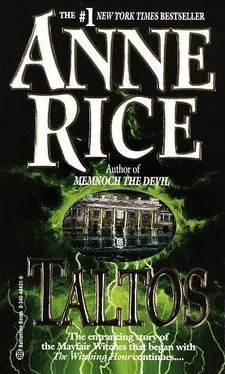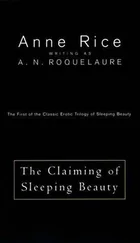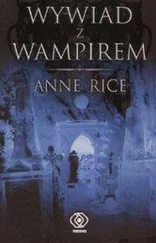Anne Rice - Taltos
Здесь есть возможность читать онлайн «Anne Rice - Taltos» весь текст электронной книги совершенно бесплатно (целиком полную версию без сокращений). В некоторых случаях можно слушать аудио, скачать через торрент в формате fb2 и присутствует краткое содержание. Год выпуска: 1996, Жанр: Ужасы и Мистика, на английском языке. Описание произведения, (предисловие) а так же отзывы посетителей доступны на портале библиотеки ЛибКат.
- Название:Taltos
- Автор:
- Жанр:
- Год:1996
- ISBN:нет данных
- Рейтинг книги:3 / 5. Голосов: 1
-
Избранное:Добавить в избранное
- Отзывы:
-
Ваша оценка:
- 60
- 1
- 2
- 3
- 4
- 5
Taltos: краткое содержание, описание и аннотация
Предлагаем к чтению аннотацию, описание, краткое содержание или предисловие (зависит от того, что написал сам автор книги «Taltos»). Если вы не нашли необходимую информацию о книге — напишите в комментариях, мы постараемся отыскать её.
Taltos — читать онлайн бесплатно полную книгу (весь текст) целиком
Ниже представлен текст книги, разбитый по страницам. Система сохранения места последней прочитанной страницы, позволяет с удобством читать онлайн бесплатно книгу «Taltos», без необходимости каждый раз заново искать на чём Вы остановились. Поставьте закладку, и сможете в любой момент перейти на страницу, на которой закончили чтение.
Интервал:
Закладка:
Columba soon convinced me that the harsh monastic life and the mortification of the flesh were the keys to the love which Christianity demanded of a man. This love was not a sensual thing. This love was spiritually elevated beyond expression through the body.
He longed to convert my entire tribe, or my clan. He longed to see me an ordained priest among my people.
“But you don’t know what you’re saying,” I said. And then, binding him under the seal of the confessional-that is, to eternal confidentiality-I told him the tale of my long life, of our secret and miraculous way of giving birth, of how it seemed that many of us seemed capable of living an endless life of eternal youth, unless accident or disaster or some specific pestilence destroyed us.
Some things I did not tell. I did not tell that I had once been the leader of the great circle dances at Stonehenge.
But all the rest I told, even of the lost land, and how we had lived in our glen for so many hundreds of years, passing from secrecy to a masquerade as human beings.
All this he listened to with great fascination. Then he said an amazing thing. “Can you prove these things to me?”
I realized that I could not. The only way any Taltos can prove he is a Taltos is by coupling with another and producing the offspring.
“No,” I said, “but look well at us. Look at our height.”
This he dismissed; there were tall men in the world. “People have for years known of your clan; you are King Ashlar of Donnelaith, and they know you are a good ruler. If you believe these things about yourself, it is because the devil has put them into your imagination. Forget them. Proceed to do what God wants you to do.”
“Ask Ninian, the whole tribe is of this height.”
But he’d heard of that, very tall Picts in the Highlands. It seems my own ruse was working!
“Ashlar,” he said, “I’ve no doubt of your goodness. Once again, I counsel you to disregard these illusions as coming from the devil.”
Finally I agreed, for one reason. I felt that it made no difference whether he believed me or not about my past. What mattered was that he had recognized a soul in me.
Michael, you know that this was a great point in Lasher’s tale-that, alive in the time of Henry, he wanted to believe that he had a soul, that he would not accept that he could not be a priest of God the same as a human.
I know this awful dilemma. All who are outsiders in their own way know it. Whether we talk of legitimacy, of a soul, of citizenship, or of brotherhood or sisterhood, it is all the same, we long to be seen as true individuals, as inherently valuable inside as any other.
This I longed for too, and I made the terrible error of accepting Columba’s advice. I forgot what I knew to be true.
There on Iona, I was received into the Christian faith. I was baptized, and so were my sons. Another baptism was to follow, but for me and my sons it was only ceremonial. On that island, removed from the mists of the Highlands, we became Christian Taltos.
I spent many days at the monastery. I read all the books that were in it; I was charmed by the pictures, and very soon took to making copies of them. With official permission, of course. I copied a psalter, then a gospel, amazing the monks with my typical Taltos obsessive behavior. I drew strange beasts in brilliant colors by the hour. I made the priests laugh sometimes with bits of poetry I copied out. I pleased them with my good Greek and Latin.
What community had ever been more like the Taltos? Monk children is what they seemed, surrendering the entire concept of sophisticated adulthood to serve the abbot as their lord, and thereby serve their Lord Himself, the Crucified Christ who had died for them.
These were happy, happy days.
Gradually I began to see what many a heathen prince had come to see in Christianity: absolute redemption of everything! All my suffering made sense in light of the woes of the world and Christ’s mission to save us from sin. All the disasters I’d witnessed had done nothing but improve my soul and school it for this moment. My monstrousness, indeed the monstrousness of all the Taltos, would be accepted by this church, surely, for all were welcome into it, regardless of race, it was an utterly open faith, and we could submit as well as any human being to the baptism of water and the spirit, to the vows of poverty, chastity, obedience.
The stringent rules, which bound even laymen to purity and restraint, would help us to control our terrible urge to procreate, our terrible weaknesses for dance and for music. And the music we would not lose; we would, within the constraints of the monastic life-which for me at this point was synonymous with the Christian life-sing our greatest and most joyful songs ever!
In sum, if this church accepted us, if it embraced us, all our past and future sufferings would have meaning. Our true loving nature would be allowed to flower. No subterfuge would be required any longer. The church would not let the old rituals be forced upon us. And those who dreaded the birthing now, as I did, out of age and experience and seeing so many young die, could consecrate themselves to God in chastity.
It was perfect!
At once, with a small escort of monks, I returned to the glen of Donnelaith and drew all my people together. We must pledge our allegiance to Christ, I told them, and I told them why, in long rippling speeches, not too fast for my human companions to understand, talking passionately of the peace and harmony that would be restored to us.
I also spoke of the Christian belief in the end of the world. Very soon all this horror would be over! And then I spoke of heaven, which I imagined to be like the lost land, except that no one would want to make love, everyone would be singing with the choirs of angels.
We must all now confess our sins and prepare to be baptized. For a thousand years I had been the leader, and all must follow me. What greater guidance could I give my people?
I stood back at the end of this speech. The monks were overcome with emotion. So were the hundreds of Taltos gathered in the glen around me.
At once began the heated discussions for which we were known-all in the human Art of the Tongue-the endless debates and telling of little tales and relating of this to that, and drawing memories into it where they seemed to pertain, and beneath it all the great theme: we could embrace Christ. He was the Good God! He was our God. The souls of the others were as open to Christ as was my soul.
A great many at once declared their faith. Others spent the afternoon, the evening, and the night examining the books I’d brought back, arguing somewhat about the things they’d heard, and there were some very fretful whispers about its being contrary to our nature to be chaste, absolutely contrary, and that we could never live with marriage.
Meantime I went out to the human beings of Donnelaith and preached this great conversion to them as well, and the monks followed me. We called all the clans of the valley together.
And in our great gathering ground, amid the stones, hundreds declared their desire to come to Christ, and indeed, some of the humans confessed they had already converted, maintaining it as a secret for their own protection.
I was very struck by this, particularly when I found that some human families had been Christian for three generations. “How very like us you are,” I thought, “but you don’t know it.”
It seemed then that all were on the verge of conversion. En masse, we begged the priests to begin the baptisms and the blessings.
But one of the great women of our tribe, Janet, as we had come to call her, a name very current then, raised her voice to speak out against me.
Janet too had been born in the lost land, which she mentioned now quite openly before the human beings. Of course they didn’t know what she meant. But we did. And she reminded me that she had no white streaks in her hair, either. In other words, we were wise and young, both of us, the perfect combination.
Читать дальшеИнтервал:
Закладка:
Похожие книги на «Taltos»
Представляем Вашему вниманию похожие книги на «Taltos» списком для выбора. Мы отобрали схожую по названию и смыслу литературу в надежде предоставить читателям больше вариантов отыскать новые, интересные, ещё непрочитанные произведения.
Обсуждение, отзывы о книге «Taltos» и просто собственные мнения читателей. Оставьте ваши комментарии, напишите, что Вы думаете о произведении, его смысле или главных героях. Укажите что конкретно понравилось, а что нет, и почему Вы так считаете.









